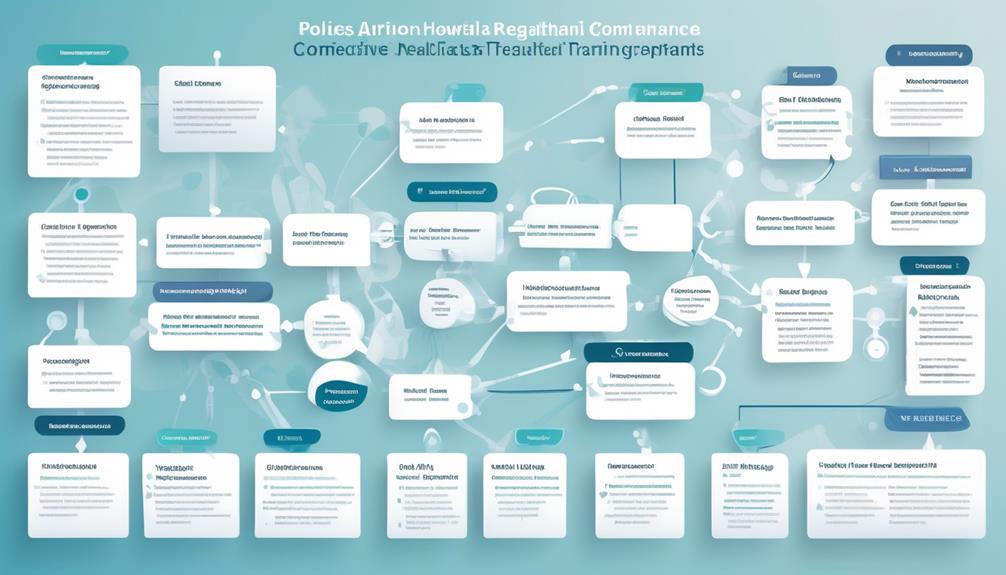Navigating the intricate world of healthcare regulations standards can feel daunting, but with the right strategies in place, it is possible to succeed.
As healthcare professionals, we understand the importance of staying ahead of the ever-evolving regulatory landscape, but where do we begin?
From designating a dedicated compliance team to fostering a culture of innovation and continuous education, the top strategies for ensuring compliance are multifaceted and require a comprehensive approach.
Join us as we explore these strategies and unlock the keys to successful healthcare regulatory standards compliance.
Key Takeaways
- Compliance with healthcare regulatory standards is crucial to protect patient safety and ensure quality care.
- Adherence to regulations promotes trust, reputation, and patient safety.
- Effective compliance programs involve designated roles, staff education, communication systems, breach plans, and corrective actions.
- Staying updated on changing regulatory standards and implementing proactive compliance strategies are essential for healthcare organizations.
Understanding Healthcare Regulatory Standards
Understanding healthcare regulatory standards is essential for ensuring compliance and providing quality care to patients. Healthcare regulatory standards encompass a wide range of rules and regulations set forth by various organizations to govern the delivery of healthcare services. These standards are designed to protect patient safety, ensure quality care, and maintain ethical practices within the healthcare industry.
Compliance with healthcare regulatory standards is critical for healthcare organizations to avoid penalties, litigation, and reputational damage. It requires a comprehensive understanding of the ever-evolving landscape of regulations and the ability to adapt to changes effectively. Healthcare providers must stay abreast of regulatory updates, such as HIPAA, HITECH, and Medicare/Medicaid guidelines, to ensure full compliance and legal adherence in their practices.
Moreover, understanding healthcare regulatory standards also involves interpreting and implementing complex legal and ethical frameworks. It necessitates meticulous attention to detail, analytical thinking, and a commitment to upholding the highest standards of patient care. By adhering to these regulations, healthcare organizations demonstrate their dedication to providing safe, reliable, and ethical care to their patients.
Importance of Compliance in Healthcare

Compliance in healthcare is pivotal, impacting patient care and entailing legal and ethical obligations.
It sets regulatory guidelines to protect patient information, maintain quality care, and prevent fraud.
Violating these regulations, such as those outlined in HIPAA, can lead to significant penalties, making adherence imperative for healthcare organizations.
Regulatory Guidelines in Healthcare
Healthcare regulatory guidelines play a critical role in ensuring the integrity and security of patient information while also upholding the highest standards of care within the healthcare industry. Adhering to healthcare regulations is crucial for maintaining regulatory compliance in healthcare, which ensures the protection of patient information, superior patient care, and prevention of fraud.
Effective healthcare compliance programs involve designated roles, staff education, communication systems, breach plans, and corrective actions. Compliance officers and healthcare management must navigate challenges such as cybersecurity, telehealth, talent acquisition, evolving regulations, and balancing compliance with innovation and quality patient care.
The HIPAA law serves as the standard for healthcare organizations, imposing severe penalties for non-compliance. It’s essential for healthcare professionals and organizations to stay abreast of compliance regulations to maintain the highest standards of care and ethical conduct.
Impact on Patient Care
Ensuring compliance with healthcare regulatory standards is imperative for safeguarding patient care and upholding the ethical integrity of the industry. Compliance not only protects patient privacy and confidentiality but also ensures the quality of patient care. Adherence to regulatory requirements promotes trust and reputation, while effective compliance measures protect healthcare workers and patients. Additionally, compliance plays a vital role in preventing fraudulent activities, maintaining industry best practices, and upholding patient safety. The table below outlines key aspects of compliance that impact patient care.
| Aspect | Impact on Patient Care |
|---|---|
| Patient Safety Organizations (PSOs) | Enhances reporting and learning from patient safety events |
| Quality Improvement Act | Promotes continuous improvement in healthcare quality |
| Health Information Technology | Facilitates secure and efficient patient information management |
Legal and Ethical Obligations
Transitioning from the impact of regulatory compliance on patient care, it becomes evident that legal and ethical obligations play a pivotal role in maintaining the integrity and trust of healthcare practices.
Healthcare providers must adhere to stringent compliance laws, ensuring patient privacy and confidentiality are upheld. Compliance with legal and ethical obligations not only protects patients but also safeguards the reputation and trust of healthcare organizations.
It’s essential for healthcare organizations to implement robust compliance strategies to mitigate the risk of penalties and legal consequences. Adhering to healthcare regulatory standards and ethical obligations ensures the delivery of high-quality care and patient safety.
Regular audits by regulatory bodies underscore the importance of staying updated and informed about changing compliance requirements. By prioritizing legal and ethical obligations, healthcare providers can uphold the highest standards of care while avoiding costly penalties and financial losses.
Key Elements of Effective Compliance Programs

Implementing effective compliance programs is essential for healthcare organizations to ensure adherence to regulatory standards and mitigate potential risks.
Key elements of such programs include:
- Leadership Commitment and Oversight
- Demonstrating leadership’s commitment to compliance through clear communication and active involvement in compliance efforts.
- Establishing a compliance committee or designating a compliance officer to oversee the program and ensure accountability.
- Policies and Procedures
- Developing comprehensive policies and procedures that align with healthcare regulatory standards, privacy and security laws, and other relevant regulations.
- Regularly reviewing and updating policies to reflect changes in laws and regulations, as well as the evolving needs of the organization.
These elements form the foundation of effective compliance programs within healthcare organizations.
By prioritizing leadership commitment, robust policies, and proactive oversight, organizations can cultivate a culture of compliance and better navigate the complex landscape of healthcare regulatory standards.
This approach not only helps in meeting legal and ethical obligations but also contributes to the overall success and sustainability of the organization.
Challenges in Healthcare Regulatory Standards

With a solid foundation in place for effective compliance programs, healthcare organizations are now confronted with a myriad of challenges in meeting and maintaining regulatory standards. The healthcare industry operates within a complex web of regulations and standards aimed at safeguarding patient privacy, ensuring data security, and preventing fraud. These challenges require a proactive and comprehensive approach to compliance strategies, as outlined in the table below.
| Challenges | Description |
|---|---|
| Evolving Regulatory Landscape | Staying abreast of constantly changing healthcare regulatory standards and adjusting strategies accordingly. |
| Data Privacy and Security | Ensuring the protection of sensitive patient information and maintaining robust cybersecurity measures. |
| Compliance with Anti-Fraud Measures | Implementing and monitoring measures to prevent fraudulent activities and billing practices. |
| Resource Constraints | Managing compliance efforts within limited budgets and resources. |
| Cultural and Organizational Shifts | Instilling a culture of compliance throughout the organization and adapting to new regulatory requirements. |
As the healthcare industry continues to navigate these challenges, it is imperative for organizations to prioritize compliance strategies that address the dynamic nature of healthcare regulatory standards. This approach will not only mitigate risks but also foster a culture of accountability and integrity within the healthcare ecosystem.
Strategies for Staying Informed

To ensure comprehensive compliance with evolving regulatory standards in healthcare, staying informed through regular reviews of emerging technologies and regulatory risks is essential. Staying informed is crucial for healthcare organizations to adapt to changing regulatory requirements and mitigate compliance risks effectively. Here are some strategies for staying informed:
- Regularly review and stay updated on emerging technologies and regulatory risks. This includes monitoring industry publications, attending relevant conferences, and engaging with regulatory agencies to understand emerging trends and potential risks.
- Foster a culture of compliance throughout the organization to ensure ongoing awareness. Encouraging open communication and collaboration between departments, as well as appointing compliance officers to oversee and coordinate compliance efforts, can help create a culture of vigilance and awareness.
Conducting Internal Audits

As we consider the points related to conducting internal audits, it’s essential to first establish the scope of the audit process, defining the areas and processes that will be reviewed.
Once the audit scope is determined, the next critical step is to focus on compliance monitoring, ensuring that all healthcare regulatory standards and organizational policies are being followed.
Lastly, after identifying any non-compliance issues, corrective action plans must be developed and implemented to address the findings and prevent future violations.
Audit Scope
When defining the scope of an internal audit for healthcare regulatory standards compliance, it’s crucial to focus on specific areas of risk and compliance within the organization.
- Consider the organizational structure, processes, and systems that will be included in the internal audit.
- This ensures a comprehensive assessment of all relevant areas of the healthcare organization.
- Identify the specific regulations and standards that the internal audit will assess for compliance.
- Tailoring the audit scope to the specific compliance requirements and safety standards is essential for accuracy and effectiveness.
Evaluating the potential impact of the internal audit findings on the organization’s overall compliance and risk management is also paramount. Determining the timeframe and resources required to conduct the internal audit effectively will further facilitate a thorough and successful audit process.
Compliance Monitoring
After defining the scope of an internal audit for healthcare regulatory standards compliance, our next focus is on the process of conducting internal audits for compliance monitoring within the organization.
Compliance monitoring involves systematically reviewing and assessing the organization’s adherence to healthcare regulatory standards, including data access and sharing protocols, and the HIPAA Privacy Rule concerning patient data.
By conducting internal audits at regular intervals, healthcare organizations can ensure that their compliance programs are effective and up to date. These audits provide valuable insights into potential compliance violations, allowing for proactive measures to address any issues and mitigate risks.
Moreover, they play a crucial role in evaluating the organization’s overall compliance posture and identifying areas for improvement to align with evolving regulatory requirements.
Corrective Action
Conducting internal audits for healthcare regulatory standards compliance involves systematically reviewing and assessing the organization’s adherence to various regulations, ensuring the effectiveness of our compliance programs and procedures.
When it comes to compliance management within healthcare organizations, conducting internal audits is crucial for maintaining quality and identifying potential areas of non-compliance.
To achieve this, healthcare organizations must establish robust internal audit processes that encompass thorough reviews of security measures, documentation, and operational protocols.
Through internal audits, organizations can proactively identify any compliance gaps and take corrective action to address them promptly.
This approach not only helps in preventing future compliance issues but also fosters a culture of accountability and continuous improvement within the organization.
Fostering a Culture of Compliance

To foster a culture of compliance, we actively promote ethical behavior and accountability at all levels of our organization. This entails encouraging open communication and creating a transparent environment where compliance concerns can be reported without fear of reprisal. We recognize the significance of ongoing education and training to ensure that all employees comprehend and adhere to regulatory standards. By providing regular training, we equip our staff with the necessary knowledge to handle patient information and maintain compliance within healthcare facilities.
Additionally, we believe in the importance of recognizing and rewarding adherence to compliance standards. This serves to reinforce the significance of ethical conduct and incentivizes employees to consistently uphold regulatory compliance.
Furthermore, we understand the impact of leading by example. As leaders, we demonstrate a commitment to compliance and ethical behavior in all organizational practices. Through our actions, we set the tone for the entire organization, emphasizing the importance of regulatory compliance.
Utilizing Technology Solutions

Utilizing cutting-edge technology solutions is essential for streamlining compliance tasks and enhancing efficiency within healthcare regulatory standards. Leveraging automated software tools allows healthcare professionals to track and manage compliance with customizable features, ensuring that regulatory standards are met.
Real-time monitoring technology plays a crucial role in ensuring adherence to regulatory requirements, providing a proactive approach to compliance. By embracing technology, healthcare organizations can simplify compliance processes and promote a culture of security, safeguarding sensitive health data and maintaining regulatory standards.
Staying up-to-date and compliant with relevant laws is made more manageable through the use of technology solutions, which provide access to real-time updates and resources for healthcare professionals to navigate complex regulatory landscapes efficiently.
Navigating Ever-Changing Regulations

Embracing cutting-edge technology solutions has enabled healthcare organizations to streamline compliance tasks and enhance efficiency within regulatory standards.
Navigating ever-changing regulations in healthcare compliance requires a proactive approach. It’s crucial to stay informed about evolving laws and standards, adapting compliance strategies to meet the latest regulatory requirements.
Foster a culture of compliance by educating and training staff on the implications of new regulations, emphasizing the importance of adhering to these ever-changing standards.
Utilizing technology solutions to automate processes and facilitate adherence to relevant laws is essential. Establishing a comprehensive compliance program tailored to address specific regulatory areas ensures that all aspects of healthcare operations are in line with the law.
Regular internal audits play a pivotal role in identifying areas of non-compliance and taking proactive measures to address potential violations.
Addressing HIPAA & Data Breaches

Comprehensive planning and robust data security measures are essential for healthcare organizations to effectively address potential data breaches and maintain compliance with HIPAA regulations. When addressing HIPAA and data breaches, it’s crucial to protect patient information, particularly electronic health records, in accordance with the Affordable Care Act and Health Insurance Portability and Health Care Anti-Fraud regulations.
To achieve this, healthcare organizations should:
- Implement robust data security measures, such as encryption and access controls, to safeguard electronic health records and other sensitive patient information.
- Regularly review and update data breach response plans to stay aligned with HIPAA and data security best practices.
- Provide ongoing staff training on data security and breach response protocols to ensure compliance with HIPAA standards and the overall goal of ensuring privacy.
Ensuring Interoperability and Data Exchange

Ensuring seamless interoperability and exchange of patient information across different healthcare systems requires the implementation of data standards and protocols. Health Level Seven (HL7) standards play a crucial role in facilitating interoperability and data exchange between various healthcare applications and systems.
Additionally, an integrated approach to data governance and management is essential to maintain consistency and accuracy in exchanged information.
The adoption of secure and standardized application programming interfaces (APIs) is pivotal for enabling efficient and secure data exchange between healthcare organizations and systems.
Furthermore, the utilization of data mapping and transformation tools is vital to ensure compatibility and consistency of exchanged data formats and structures.
Compliance with the Health Insurance Portability and Accountability Act (HIPAA) is integral to safeguarding the privacy and security of healthcare information during the exchange process.
This adherence not only ensures regulatory compliance but also contributes to quality improvement and supports the seamless exchange of clinical health data, including Emergency Medical Treatment information, within the healthcare ecosystem.
Managing False Claims & Whistleblower Suits

and whistleblower suits
- Staying Informed:
- Understanding the False Claims Act
- Best practices for preventing fraud and mitigating risks
Implementing Comprehensive Compliance Programs

Our healthcare organization is dedicated to establishing and maintaining comprehensive compliance programs that uphold regulatory standards and promote ethical practices across all operational facets. Implementing robust compliance programs is essential for ensuring healthcare compliance, maintaining regulatory standards, and delivering quality care to our patients. These programs also safeguard our organization’s reputation, mitigate legal risks, and prevent financial penalties associated with non-compliance. To achieve these goals, we have devised the following strategies to effectively implement comprehensive compliance programs:
| Key Strategies | Description |
|---|---|
| Leadership Commitment | Engage senior management to champion compliance efforts, allocate resources, and set the tone at the top. |
| Risk Assessment | Conduct regular assessments to identify compliance risks, prioritize areas of concern, and implement proactive measures. |
| Policies and Procedures | Establish clear and comprehensive policies and procedures that align with regulatory requirements and best practices. |
| Training and Education | Provide ongoing training and education to employees, ensuring they understand their compliance responsibilities. |
| Monitoring and Auditing | Implement regular monitoring, auditing, and internal controls to detect and address compliance issues proactively. |
Leveraging Compliance Management Software

Implementing a compliance management software system is crucial for streamlining and automating our healthcare organization’s regulatory adherence tasks. This software allows us to track and manage adherence to healthcare regulations, ensuring that we stay updated and compliant with evolving laws and regulations.
Leveraging compliance management software simplifies our compliance efforts and promotes efficiency through automated solutions. In addition, the real-time monitoring features of compliance management software enable us to ensure adherence to requirements and promptly address any compliance issues that may arise.
- Benefits of Compliance Management Software:
- Automated tracking and management of regulatory adherence tasks
- Simplification and promotion of efficiency in compliance efforts
Frequently Asked Questions
What Are Compliance Standards in Healthcare?
Compliance standards in healthcare encompass regulations that protect patient information and ensure high-quality care. HIPAA law is a key standard, with penalties for non-compliance. To meet these standards, organizations designate a compliance officer, offer employee training, and establish open communication for reporting concerns.
Challenges include cybersecurity and adapting to evolving regulations while maintaining innovation and patient care. Adhering to these standards is crucial for patient safety and trust.
What Are Regulatory Standards in Healthcare?
Regulatory standards in healthcare encompass guidelines and requirements set by governing bodies to ensure patient safety, privacy, and quality care. It covers areas like patient privacy, data security, billing practices, and quality improvement programs.
HIPAA serves as a fundamental standard for protecting patient information and is a key regulatory benchmark for healthcare organizations.
Staying updated on emerging technologies, risks, and changes in regulations is crucial for maintaining compliance in healthcare.
What Are 5 Regulations That Impact Healthcare Practices?
Five regulations impacting healthcare practices include:
- HIPAA: This regulation governs patient privacy and ensures that healthcare organizations protect patients’ personal health information.
- HITECH: This regulation focuses on electronic health records security and encourages the adoption of technology in healthcare to improve patient care and communication.
- EMTALA: This regulation mandates that emergency medical services provide access to medical treatment, regardless of a patient’s ability to pay or insurance status.
- ACA: The Affordable Care Act aims to improve access to healthcare by expanding insurance coverage, implementing preventive care measures, and regulating insurance practices.
- CMS guidelines: These guidelines are set by the Centers for Medicare and Medicaid Services and outline requirements for healthcare providers participating in federally funded healthcare programs.
Adhering to these regulations is crucial for healthcare organizations to maintain legal and ethical practices, ensure patient safety, and receive reimbursement for federally funded healthcare programs.
Compliance with these regulations is integral to upholding high standards of care and organizational integrity.
What Are the Common Compliance Regulations?
We understand the importance of common compliance regulations in healthcare, such as HIPAA, HITECH, EMTALA, ACA, and the False Claims Act. These regulations cover patient privacy, data security, quality care delivery, and billing and coding practices.
Staying updated on ever-changing regulations, protecting patient data, and preventing fraudulent activities are crucial challenges in healthcare compliance.
Our healthcare compliance programs include policies, training, auditing, and fostering a culture of compliance throughout the organization.
Conclusion
In conclusion, by designating a chief compliance officer, developing employee education programs, establishing effective communication systems, and implementing corrective action processes, we can ensure that our healthcare organization remains compliant with regulatory standards.
These strategies not only help us stay informed and manage challenges, but also promote quality patient care and foster a culture of innovation.
With continuous staff training and investment in regulatory programs, we can navigate the complex landscape of healthcare regulatory standards effectively.









